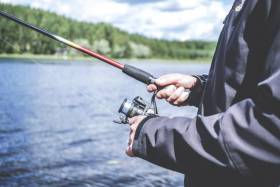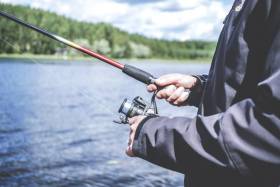Displaying items by tag: Angling Licence
Salmon and Sea Trout Licences for 2023 On Sale Now
Salmon and sea trout licences for 2023 are now available for immediately purchase through the Inland Fisheries Ireland (IFI) online shop.
Hard-copy licences will be available from distributors around the country over the coming weeks, adds the State body for the protection, management and conservation of Ireland’s inland fisheries and sea angling resources.
There are no price increases for salmon and sea trout angling/rod licences for 2023 and there are seven different types of licence available:
- The A: Annual Licence (€100) entitles you to fish for salmon and sea trout in all fishery districts during the 2023 season.
- The B: District Licence (€64) allows you to fish for salmon and sea trout in one fishery district only for the 2023 season.
- The P: Juvenile Licence (€10) is for anglers up to and including 17 years of age. This licence entitles you to fish for salmon and sea trout in all fishery districts for the 2023 season.
- The R: 21-Day Licence (€50) is an all-districts licence which entitles you to fish for salmon and sea trout on 21 consecutive days in 2023 season.
- The S: 1-Day Licence (€36) is a single day, all-districts licence and entitles you to fish for salmon and sea trout.
- The W: Foyle Area Extension Licence (€84) entitles you to fish for salmon and sea trout in the Republic of Ireland in all fishery districts. However, to acquire one from IFI, an angler must have acquired a valid ‘Adult Game Season’ licence or ‘Adult Game Endorsement’ licence from the Loughs Agency.
- The X: Special Local Licence (€26) is required to fish for sea trout in the Erne Estuary.
Prices for angling/rod licences in Ireland are approved by the Minister for the Environment, Climate and Communications and the Minister for Public Expenditure and Reform on foot of a recommendation by the board of IFI. These are the prices that will be applied by IFI for all angling/rod licences purchased for the 2023 season.
Half of the revenue generated from licence fees goes directly into the Habitat and Conservation Fund to help fund salmon and sea trout habitat improvement, fisheries conservation, and protection activities in Ireland.
Since 2016, more than €6 million in grants have been awarded to over 280 projects throughout the country under various funding schemes operated by IFI.
To buy your 2023 salmon and sea trout licence now, visit the Inland Fisheries Ireland online shop.
Salmon & Sea Trout Angling Licences For 2020 Are Now Available Online
Licences for salmon and sea trout angling for the 2020 season can now be purchased online along with log books and gill tags, Inland Fisheries Ireland (IFI) has announced.
Licence fees remain the same across all classes including those for juvenile anglers. An annual licence covering all districts costs €100 (€10 for juveniles under 18 years), while licences for single districts are €56 for the year, €40 for 21 days and €20 for a single day. Licences for the Foyle Area Extension are €80.
Anglers are legally required to be in possession of a licence when fishing for salmon or sea trout.
Licences should be purchased online by next Wednesday 18 of December to allow time for delivery before Christmas and the New Year. IFI cannot guarantee dispatch in advance of the holidays due to postage deadlines.
Online licences can also be acquired directly from your local IFI office or approved online licence sales distributors.
Angling licences other than online sales will be available to purchase in approved licence sales distributors from the end of December or early January.
IFI also reminds all salmon and sea trout anglers to return their 2019 angling logbook and unused gill tags as soon as possible, even if there is no catch recorded.
These returns will provide vital information regarding the status and management of our wild Atlantic salmon and sea trout stocks for the future.
Anglers are asked to use the business return envelope which was supplied at the time of license purchase. In the absence of the prepaid return envelope, anglers can return their completed logbook and unused tags to the IFI office address on their licence/logbook.
Warning To Anglers Over Rogue Fishing License Website
Inland Fisheries Ireland (IFI) is alerting the public to a rogue website which claims to sell salmon and sea trout angling licenses for Ireland.
The website, which carries IFI branding, asks anglers for their personal and payment details but does not supply legitimate fishing licenses.
Anglers are reminded that the only authorised website for salmon & sea trout licenses is at store.fishinginireland.info
This site is operated by IFI, and anglers will receive receipt of any purchases on this website via email.
IFI advises any member of the public who has submitted personal or financial details to a fraudulent fishing license website to contact their local Garda station directly to report the incident.





























































